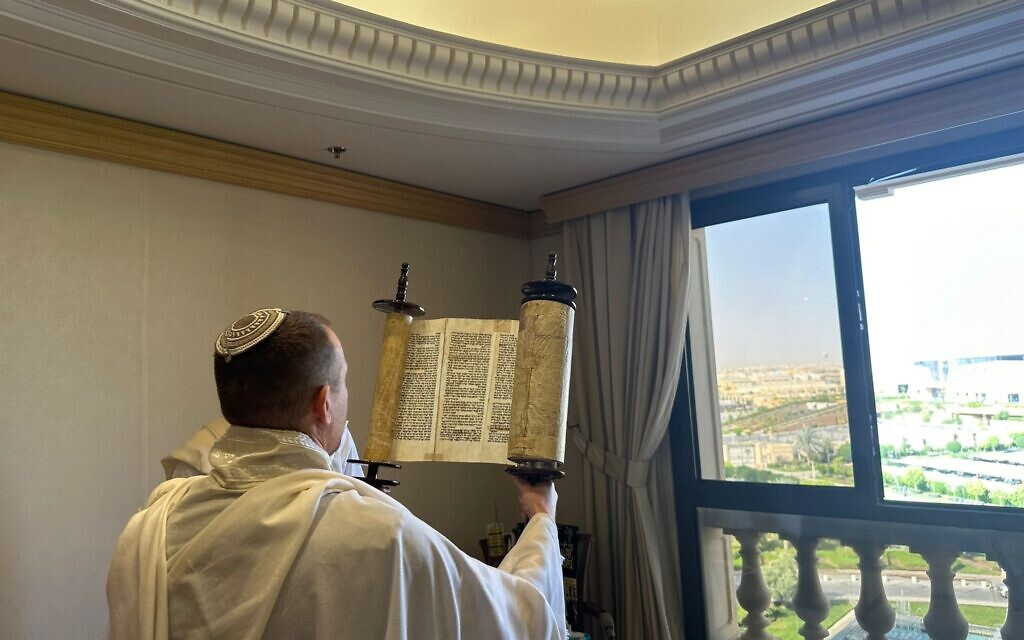This Editor’s Note was sent out earlier Wednesday in ToI’s weekly update email to members of the Times of Israel Community. To receive these Editor’s Notes as they’re released, join the ToI Community here.
Members of the official Israeli government delegation currently visiting Saudi Arabia have been holding morning prayers in their Riyadh hotel, The Times of Israel reported on Tuesday, reading the text for the intermediate days of Sukkot from a Torah scroll dedicated to the Saudi king and crown prince.
Whoa! What?
An official Israeli government delegation is visiting Saudi Arabia? They’re davening with a minyan in a Riyadh hotel? Openly? Telling the world about it? Reading from a Sefer Torah whose cover is inscribed “Jewish Congregation – Kingdom of Saudi Arabia” in English and Arabic, with a Hebrew dedication to the monarch, his son “and all their ministers and advisers”?
Two weeks ago in New York, US President Joe Biden joked to Prime Minister Benjamin Netanyahu that they’d have had to be drunk if, 10 years ago, they’d found themselves “talking about normalization with Saudi Arabia.”
And yet here we are, already, with ministers making unprecedented official visits — the current delegation led by Communications Minister Shlomo Karhi is the second to make the trip in the space of a week — and being hosted in one of the most resonantly normalized ways one can conceive.

A Torah scroll dedicated to the Saudi king and crown prince, in Riyadh, Saudi Arabia, October 3, 2023. (Spokesman’s Office, Communications Ministry)
Official Israeli government representatives visiting a country that does not recognize the fact of Israeli sovereignty. Visiting a country hitherto notorious for the promulgation and export of radical Islam. And praying fervently in Hebrew — with what Karhi’s spokesman has assured The Times of Israel was Saudi agreement, including permission to bring several Jews who live in Saudi Arabia into the hotel to complete the minyan. Praying, albeit out of the public eye, that is, in a country that outlaws the public practice of any religion other than Islam.
On the same day as Netanyahu’s sit-down with Biden, Crown Prince Mohammed bin Salman said in a US TV interview that our two countries are getting closer “every day” to normalized relations. Netanyahu told the UN General Assembly two days later that we are “at the cusp” of a historic peace with transformational implications for relations in the region and relations among religions.
The Israeli minyan in Riyadh — at once routine and utterly extraordinary — offers a glorious insight into what might evolve.
And yet…
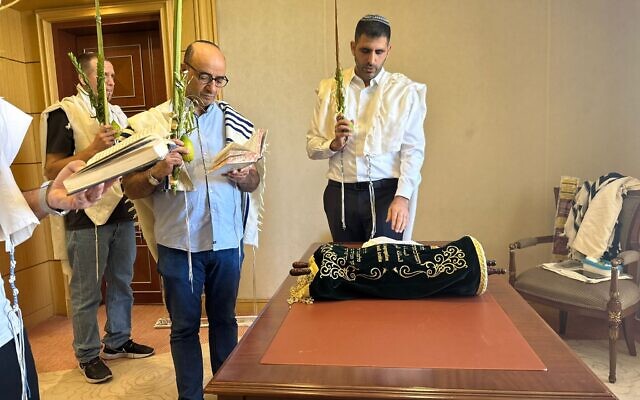
Communications Minister Shlomo Karhi (right) prays during a morning service, during Sukkot, in Riyadh, Saudi Arabia, October 3, 2023 (Spokesman’s Office, Communications Ministry)
It’s not all about us
For all the evident desire of the three parties — the US, Israel and Saudi Arabia — there is no knowing how, when or even whether this process will successfully play out.
Despite our understandable focus on the Israel-Saudi bilateral aspect, the bigger picture is of a Biden Administration seeking to remake US relations with the Saudis — with oil interests, fears of China, the need for Middle East stability and more at stake — and no assurance of a smooth process domestically for getting it done.
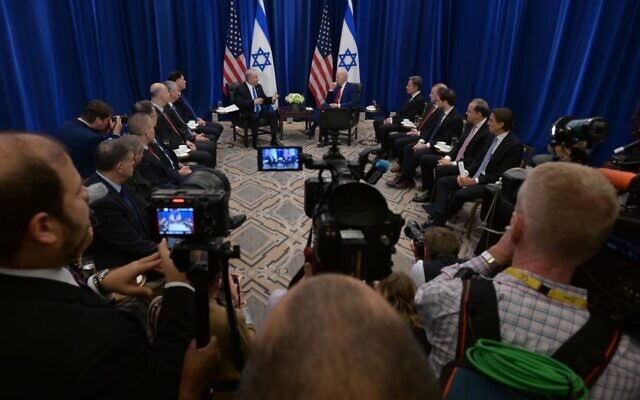
US President Joe Biden and his team meet with Prime Minister Benjamin Netanyahu and his team on the sidelines of the 78th United Nations General Assembly in New York City on September 20, 2023. (Avi Ohayon, GPO)
The bigger picture, too, is of an energetic Saudi leadership pushing a social, religious and economic transformation, moving away from the absolute reliance on oil revenues, offering an increasingly liberalized lifestyle for its fast-growing young population, and, crucially in our context, attempting to persuade potential international economic and military partners that Saudi Arabia is no longer the forbidden kingdom but a dependably stable, tolerant and welcoming environment.
For MBS, it involves a complex balancing act — overseeing radical change at home, with the potential for clerical resistance; avoiding a devastating deterioration vis-a-vis Iran; being perceived, at least, as not abandoning the Palestinian cause.
It may also involve a consideration of whether to proceed right now, under a US president who was openly hostile to Riyadh until recently, or hold back a little, for a different and potentially more accommodating administration, albeit one that might have a still harder job than Biden in getting Senate approval.
But if the shift is to be achieved, a hugely helpful catalyst is warmed relations with Christianity and Judaism — and how better to demonstrate this than by normalizing ties with the world’s Jewish state.
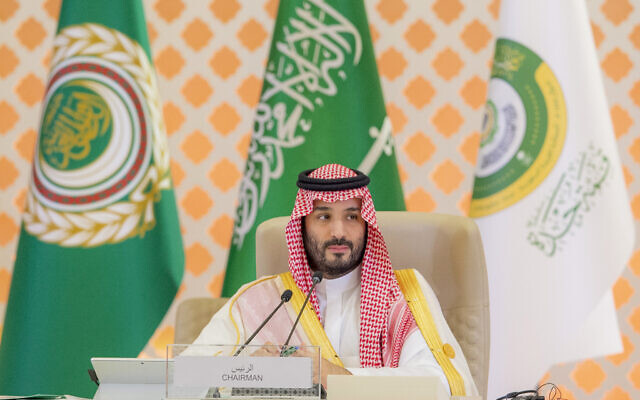
In this photo provided by the Saudi Press Agency, SPA, Saudi Crown Prince Mohammed bin Salman chairs the Arab summit in Jeddah, Saudi Arabia, Friday, May 19, 2023. (Saudi Press Agency via AP)
As for Netanyahu, as he made explicit in his UN General Assembly speech, the astonishing Saudi opportunity is further vindication, first provided by the Abraham Accords, of his conviction that the circle of peace for Israel can be widened without the prior resolution of the Israeli-Palestinian conflict.
Bin Salman said in his interview that he’d work on an agreement with whoever is running Israel. But for Netanyahu, if a deal can be done, and if he can do it, it offers a partial, potentially stellar legacy — as Israel’s peerless regional peacemaker.
He said in his own US TV interviews two weeks ago that, if obstacles such as those surrounding the Saudis’ desire for a civilian nuclear program can be overcome and an agreement achieved, “I’ll carry my coalition, and the country with it.”
The first assertion is highly debatable, certainly if there are to be remotely substantive concessions to the Palestinians. The second is undeniable.
And yet…
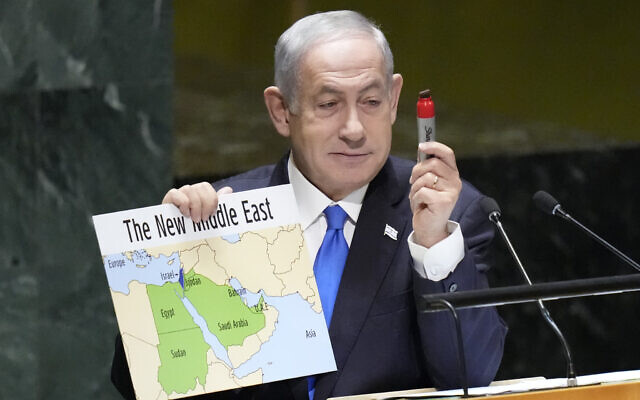
Prime Minister Benjamin Netanyahu prepares to use a red marker on a map of ‘The New Middle East,’ as he addresses the 78th session of the United Nations General Assembly, Friday, September 22, 2023. (AP Photo/Mary Altaffer)
Stop. Build consensus. Fire the hate-mongers
As the prime minister takes a Sukkot vacation at Neve Ativ in the Golan Heights this week, shortly before the Knesset reconvenes for its winter session on October 15, all patriotic Israeli Zionists should be hoping that any dreams he’s enjoying about leading Israel into a glorious new era of regional relationships are offset by nightmares about the hate-filled domestic climate for which he bears primary responsibility.
Nine months ago, he opened the door for Justice Minister Yariv Levin to declare war on Israeli democracy — to unveil legislation, that Netanyahu has not abandoned, by which Israel’s judiciary would be subjugated, one way or another, to the will of the elected majority. As a consequence of that ongoing threat to Israel’s system of governance, and by extension to the most basic rights that our justices, and only our justices, protect from politicians’ abuse, massed ranks of Israeli citizens continue to rise up in protest.
For nine months, the rifts have widened and spread — exacerbated as the hate-mongering politicians that Netanyahu empowered, led by Itamar Ben Gvir, unsurprisingly stir hatred: between Jews and Arabs, Jews and Christians, Jews and Jews.
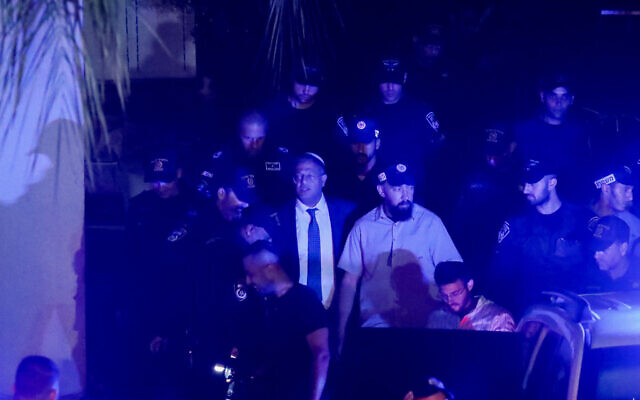
Itamar Ben Gvir, Minister of National Security, at the scene where five family members were shot to death in their home in the northern Israeli Bedouin town of Basmat Tab’un, September 27, 2023. (Shir Torem/Flash90)
Murder rates are soaring in the Arab community, and in the Jewish community. Christians in the Holy Land are spat upon… by Jews, indulged if not encouraged by Ben Gvir and his ilk. The convicted Jewish murderer of a Palestinian family is championed. Yom Kippur is sullied by politics, religious coercion and fear of political coercion. A chief rabbi — an appointee whose salary is paid by Israeli citizens — returns to his frequent theme of denigrating those who do not share his approach to our faith.

A Jewish man seen spitting at Christians in Jerusalem during a parade for the festival of Sukkot on October 4, 2023. (Israel Police)
Week by week, indeed day by day, the internal divides are deepening. And very soon now, Netanyahu and his coalition colleagues will be returning to the Knesset to renew hostilities — with the ultra-Orthodox demanding passage of the law that will exempt their young males from military or national service, Levin still hell-bent on imposing a judicial overhaul that the electorate was not told it was voting for last year, and Netanyahu projecting his recent uncharacteristic weakness despite the economic malaise, the frictions in the military, the veritable fracturing of our society.
The very fact of this country’s existence, its survival, its growth, the innovations it has pioneered and brought to the world, combine to constitute a near-miracle. But its purpose remains essential — for the safety and fulfillment of its own population, and for the well-being of Jews around the world. We simply must not allow Israel to tear itself apart.
Bin Salman, yes; Ben Gvir, no
As exemplified by a small but wondrous Jewish prayer-gathering in Riyadh, Israel now has an opportunity to further stabilize, even cement, its presence in this region. I wrote above of the “partial, potential stellar legacy” this would give Netanyahu. But that will not be his legacy if he fails to arrest the collapse of our nation’s internal unity, resolve, and mutual respect.
Salvaging our domestic resilience requires halting, not advancing, the divisive legislation on the coalition’s agenda for the coming months. It requires building painstaking and long-lasting consensus for any substantive changes in the way Israel is governed, and for the way the national burdens, responsibilities and resources are shared.
Needless to say, it requires ousting, from positions of centrality, ministers bent on turning Israel into a racist, Jewish-supremacist entity — because they are anathema to all sane Israelis; because they inflame extremism; because they shame us in the eyes of the world; because they should, of course, never have been ushered into the political mainstream in the first place.
Netanyahu can’t do any of that and, to paraphrase him, carry his coalition. So much the better. He would carry this country — or at least begin to carry it — back to an ethos of relative consensus and tolerance.
Does he really need a lesson from one of the more improbable of places, a hotel room in Riyadh, Saudi Arabia, to remind him of that paramount obligation to Israel?

Communications Minister Shlomo Karhi (right) during a morning prayer service in Riyadh, Saudi Arabia, October 3, 2023. (Spokesman’s Office, Communications Ministry)

